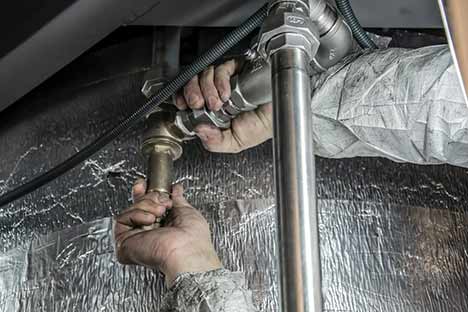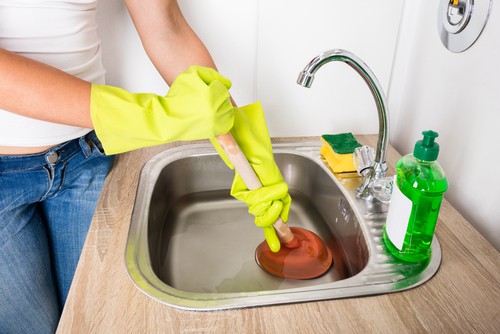Addressing Emergency Plumbing Problems: Fast Tips Until Professional Help Arrives
Click HereAny individual maintains his or her own thinking in relation to Plumbing Emergencies: Tips on What To Do Before.

Pipes emergency situations can strike at any moment, creating anxiety and possible damages to your home. Whether it's a ruptured pipeline, a clogged up drainpipe, or a dripping tap, recognizing just how to take care of the scenario till a specialist plumber arrives can conserve you from more difficulties. This article provides essential emergency situation plumbing suggestions to assist you reduce damage and restore control throughout a pipes situation.
Switch off the Supply Of Water
The first step in any kind of pipes emergency is to shut down the water system. For localized concerns, such as a dripping faucet or commode, turn off the shutoff near the component. When it comes to a major leak or burst pipeline, find your home's primary water shut-off valve and transform it off quickly. Recognizing the place of these valves beforehand can conserve useful time during an emergency.
Address Tiny Leakages with Momentary Fixes
Small leakages can swiftly become substantial issues if left unattended. Use these short-lived repairs until specialist assistance arrives:
While these solutions aren't permanent, they can assist reduce water loss and damage.
Unclog Drains Pipes Safely
A clogged drainpipe can be a discouraging and untidy issue. Below's exactly how to tackle it:
If these techniques do not work, stay clear of using too much force, as it might intensify the clog.
Handle Overflowing Toilets
An overruning bathroom can create immediate disorder. Here's what you need to do:
Turn off Your Hot Water Heater
In specific emergency situations, such as a burst pipeline, it's a good idea to turn off your water heater. This stops getting too hot or damage to the device when water stops streaming. Turn off the power supply to the hot water heater (electrical or gas) and let it cool to avoid prospective threats.
Temporarily Quit a Ruptured Pipe
A ruptured pipeline can result in substantial water damage in minutes. To minimize the issue:
Call an expert plumber instantly to deal with the trouble completely.
Handle Frozen Pipeline Very Carefully
In chillier environments, icy pipes are a common emergency. If you presume an icy pipeline:
Prevent Further Damage
Taking quick action to reduce damage can conserve you money and time in the future. Below's just how:
. Have an Emergency Situation Pipes Set
Prepare a fundamental plumbing emergency kit to deal with minor issues effectively. Your package needs to consist of:
Having these devices available can make a considerable difference in your ability to take care of emergency situations.
Know When to Call an Expert.
While quick fixes can assist temporarily, certain pipes concerns need immediate professional focus. Call a plumbing professional if:.
Promptly calling a specialist makes sure the issue is solved correctly and stops further difficulties.
Conclusion.
Pipes emergencies can be frustrating, but with the ideal knowledge and devices, you can take care of the circumstance properly until aid arrives. By shutting off the water supply, attending to tiny leaks, and utilizing temporary repairs, you can decrease damage and maintain your home safe. Bear in mind, these suggestions are momentary solutions; always get in touch with a licensed plumbing technician to take care of the root cause of the issue. Prep work and quick thinking are your finest allies in any kind of plumbing emergency.
Expert Tips for Emergency Plumbing Repairs
Plumbing emergencies can be incredibly stressful and inconvenient. Whether it’s a burst pipe, a clogged drain, or a leaky faucet, these common plumbing emergencies need immediate attention to prevent further damage to your home. But before you panic, it’s important to understand the basics of plumbing repairs and the steps you can take to address these emergencies. In this article, we will share some expert tips to help you navigate through these situations and minimize potential water damage.
Identifying Common Plumbing Emergencies
Leaky pipes and faucets Clogged drains and toilets Burst pipes Low water pressure Water heater problems Essential Tools for Plumbing Repairs
Plunger: Useful for unclogging toilets and drains Adjustable wrench: Needed for tightening or loosening nuts and bolts Pipe wrench: Ideal for gripping and turning pipes Tape measure: Necessary for accurate pipe measurements Plumber’s tape: Helps create watertight seals Understanding Emergency Plumbing Services
Emergency plumbing services are designed to provide immediate assistance for unexpected plumbing issues that can cause significant damage to your home, business, or health. These services are typically available 24/7 and are staffed by experienced plumbers who can quickly diagnose and repair a wide range of plumbing problems.
When a plumbing emergency strikes, time is of the essence. Whether it’s a burst pipe flooding your basement or a gas leak posing a serious risk, emergency plumbing services ensure that help is just a phone call away. These professionals are equipped with the tools and expertise to handle any situation, minimizing damage and restoring your plumbing system to proper working order.
What Constitutes a Plumbing Emergency?
Burst pipes or water supply lines: These can cause extensive water damage and need immediate repair to prevent flooding. Gas leaks or suspected gas leaks: Gas leaks are extremely dangerous and require prompt attention to avoid potential explosions or health hazards. Sewer backups or overflows: These can lead to unsanitary conditions and significant property damage. Clogged drains or toilets causing water to overflow: Overflowing water can damage floors, walls, and other structures. Leaks or water damage causing structural damage: Persistent leaks can weaken the structural integrity of your home or business. No hot water or heating: A lack of hot water can be more than an inconvenience, especially in colder months. Common Causes of Plumbing Emergencies
Aging or corroded pipes: Over time, pipes can deteriorate, leading to leaks or bursts. Improperly installed or maintained plumbing fixtures: Faulty installations or lack of maintenance can result in unexpected failures. Tree roots or other debris infiltrating your sewer line: Roots can grow into pipes, causing blockages and backups. Frozen pipes or water supply lines: In colder climates, pipes can freeze and burst, leading to significant water damage. High water pressure or sudden changes in water pressure: Excessive pressure can strain pipes and fixtures, causing them to fail. Natural disasters such as floods or earthquakes: These events can disrupt your plumbing system and cause severe damage. Steps to Minimize Water Damage
Locate the water shut-off valve: Knowing where the valve is can help you quickly cut off the water supply to the affected area. Turn off the water heater: If there’s a risk of water coming into contact with the heating element, make sure to turn off the water heater to avoid potential accidents. Open faucets and drain pipes: By opening faucets and drain pipes, you can relieve pressure and empty any standing water. Collect and contain water: Use towels, buckets, or bins to collect water and prevent it from spreading to other areas of your home. https://leecountyplumbingandwellservice.com/expert-tips-for-emergency-plumbing-repairs/

Do you appreciate more info about Expert Tips for Managing a Plumbing Emergency Until Help Arrives? Write a comment down the page. We would be happy to see your ideas about this write-up. We hope to see you back again in the future. Remember to take the opportunity to promote this blog post if you enjoyed reading it. Thank you for taking the time to read it.
Or Book Technician Here